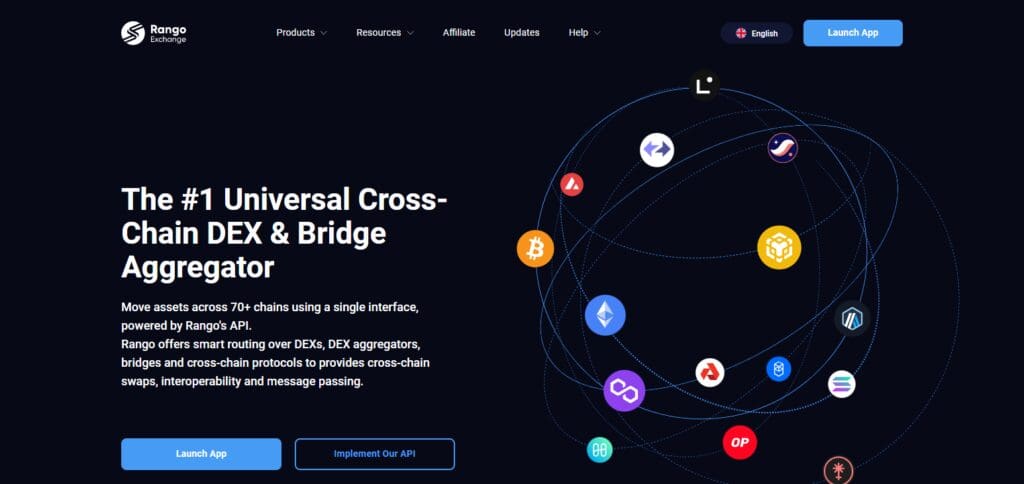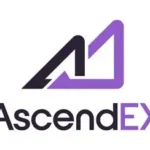In this article, I explain the Best Crypto Bridge Aggregator With Minimal KYC. These services enable the easiest borderless asset transfers between different blockchains while minimizing the burden of identity checks.
Whether you are new or an advanced crypto user, these platforms eliminate the problems associated with easier integration with DeFi networks and optimize fees associated with swaps.
10 Best Crypto Bridge Aggregator With Minimal KYC
1. Rango Exchange
Rango Exchange is an advanced cross-chain bridge aggregator that integrates with a multitude of DEXs, Bridges and Aggregators for effortless asset transfers between different blockchains. It has both EVM and non-EVM chains with once-off KYC, fast transaction speeds and low fees.

Users can effortlessly swap tokens between various networks without manually picking out bridges, which makes it simple and convenient.
Additionally, it works with the best bridges like Stargate, deBridge, and cBridge to get the best route. All these paired with competitive pricing makes it one of the best bridge aggregators available.
| Feature | Rango Exchange |
|---|---|
| KYC Requirements | Minimal KYC required (no full KYC for basic transfers). |
| Fees | Low transaction fees, as it aggregates multiple bridges to find the most cost-effective route. |
| Supported Blockchains | Supports a wide range of EVM and non-EVM blockchains (e.g., Ethereum, Binance Smart Chain, Polygon, Avalanche, Solana, etc.). |
| Transaction Speed | Fast asset transfers through optimized routing and reduced bridge congestion. |
| Cross-chain Support | Seamless cross-chain swaps across many blockchain ecosystems. |
| Supported Assets | Supports a wide variety of tokens, including ERC-20, BEP-20, and other major blockchain tokens. |
| Security | High security, with integration of trusted bridges and decentralized routes. |
| User Interface | Simple, user-friendly interface for both beginners and experienced users. |
| Integration with DeFi | Full integration with DeFi platforms like Uniswap, Sushiswap, and more. |
| Transaction Types | Supports token swaps, liquidity provision, and bridging assets. |
| Liquidity Sources | Aggregates liquidity from various decentralized exchanges (DEXs) and cross-chain bridges. |
| Customer Support | Offers responsive support, often through live chat or community channels. |
| Multi-chain Compatibility | Strong multi-chain compatibility with various Layer 1 and Layer 2 networks. |
| Use Case | Ideal for users seeking fast, secure, low-fee cross-chain transfers with minimal friction. |
2. LI.FI
LI.FI is a blockchain agnostic liquidity protocol that enables cross-chain asset transfers across a multitude of bridging protocols and Decentralized Exchanges (DEX).
It provides comprehensive advanced routing by taking pesky stipulations such as bridge security, fees, and slippage into account, making it essential.

LI.FI is very popular among developers within EVM chains and non-EVM chains and is utilized in DeFi applications to facilitate easy cross-chain token swaps.
LI.FI’s goal being to eliminate complexity and streamline transactions, improves the overall efficiency of the capital and the user experience in decentralized finance.
| Feature | LI.FI Exchange |
|---|---|
| KYC Requirements | Minimal KYC for basic usage, no full verification needed for most transfers. |
| Fees | Low fees, optimized by aggregating liquidity and selecting the best routes. |
| Supported Blockchains | Ethereum, Binance Smart Chain, Polygon, Avalanche, Solana, and others. |
| Transaction Speed | Fast transfers due to efficient liquidity routing and bridge selection. |
| Cross-chain Support | Supports numerous blockchains, enabling seamless asset swaps. |
| Security | High security with decentralized validators and trusted bridge integrations. |
| User Interface | Simple and intuitive interface for easy use. |
| Integration with DeFi | Fully integrated with leading DeFi platforms for liquidity and asset swaps. |
3. Socket (Bungee Exchange)
Earlier called as Bungee Exchange, Socket is a decentralized protocol for moving assets across different chains. It accomplishes this by pooling together different bridges so that the users can experience the lowest fees and fasted routes.

Socket allows for direct asset transfers, cross-chain swaps, and liquidity aggregation, making it popular among developers and traders alike. It’s smart routing algorithm picks the most appropriate route for the users based on ideal speed, security, and cost.
With integrations across major DeFi protocols, Socket improves multi-chain ecosystem interoperability and makes using different blockchains much easier.
| Feature | Socket Exchange |
|---|---|
| KYC Requirements | Minimal KYC for most transactions, no full verification required. |
| Fees | Low fees by aggregating multiple liquidity sources for optimal routes. |
| Supported Blockchains | Supports Ethereum, Binance Smart Chain, Polygon, and more. |
| Transaction Speed | Fast asset transfers due to smart routing and optimized bridges. |
| Cross-chain Support | Seamless cross-chain swaps across a variety of blockchain ecosystems. |
| Security | High security with decentralized processing and trusted bridge integrations. |
| User Interface | Simple and easy-to-use interface for quick transactions. |
| Integration with DeFi | Integrates well with decentralized finance platforms for liquidity. |
4. Jumper Exchange
The Jumper Exchange is a novel cross-chain bridge aggregator that enhances the interaction between multple perturb networks allowing easy transfer of assets.

It pools liquidity from a variety of DEXs as well as bridges, showcased by their improved user rates. Jumper Exchange focuses on security and integrates their systems with Stargate, cBridge, and Hop Protocol.
This platform uses low slip and low transaction pairs to allow for easy interactions. DeFi participants rely on this service since it provides ease when moving assets across multple blockchains without translates along bridges.
| Feature | Jumper Exchange |
|---|---|
| KYC Requirements | Minimal KYC required, with no full verification for most transfers. |
| Fees | Low transaction fees by aggregating liquidity from multiple bridges. |
| Supported Blockchains | Supports Ethereum, Binance Smart Chain, Polygon, Avalanche, and more. |
| Transaction Speed | Fast asset transfers through optimized routing and low latency. |
| Cross-chain Support | Seamless cross-chain swaps across a broad range of blockchain networks. |
| Security | High security with decentralized bridge integration and smart contract audits. |
| User Interface | Clean, user-friendly interface for simple cross-chain transactions. |
| Integration with DeFi | Fully integrated with major DeFi protocols for liquidity and swaps. |
5. Odyssey
Odyssey is an up-and-coming solution for interoperability between different blockchain networks that allows assets to be transferred between them, so it can be classified as a cross-chain bridge.
The high liquidity aggregator enables users to cutoff the cost incurred during transferring digital assets. Odyssey provides its users with secure and speedy routing for cross-chain digital asset transfers.

To reduce the risk of failing transactions and extending the danger of bridging, Odyssey’s smart contract infrastructure actively works towards decreasing the risks.
Although not as recognized as some of its competitors, Odyssey offers focuses integrating its protocols with the DeFi as well as having a sleek and user friendly design.
| Feature | Odyssey Exchange |
|---|---|
| KYC Requirements | Minimal KYC required for most transactions. |
| Fees | Low fees optimized by aggregating liquidity across multiple bridges. |
| Supported Blockchains | Supports Ethereum, Binance Smart Chain, Polygon, Avalanche, and more. |
| Transaction Speed | Fast transfers through optimized routing and bridge selection. |
| Cross-chain Support | Seamless cross-chain swaps across various blockchain ecosystems. |
| Security | High security with decentralized validator networks and trusted bridges. |
| User Interface | Simple, user-friendly interface for quick asset transfers. |
| Integration with DeFi | Integrates well with major DeFi platforms for liquidity and swaps. |
6. deBridge
deBridge is a decentralized cross-chain interoperability protocol designed for quick and secure asset movements between various blockchain platforms.
In contrast to central bridges, deBridge utilizes a decentralized network composed of validators for transaction processing which greatly reduces the possibility of attacks and censorship.

Da Bridge fosters asset swaps, NFT exchanges, and data transmission between different blockchains. In order to achieve scalable and effective secure.
DeBridge maintains a focus on effective liquidity routing and utilizes tried and tested smart contacts. This is a common use case for DeFi applications that need dependable cross-chain interaction at low trust threshold.
| Feature | deBridge Exchange |
|---|---|
| KYC Requirements | Minimal KYC, with no full verification required for most transactions. |
| Fees | Low fees by aggregating liquidity from multiple trusted bridges. |
| Supported Blockchains | Supports Ethereum, Binance Smart Chain, Avalanche, Solana, and more. |
| Transaction Speed | Fast transactions with optimized routing for low latency. |
| Cross-chain Support | Seamless cross-chain asset swaps across a broad range of blockchains. |
| Security | High security with decentralized validators and trusted bridge partners. |
| User Interface | Clean and intuitive interface for easy cross-chain transfers. |
| Integration with DeFi | Fully integrated with leading DeFi platforms for liquidity and trading. |
7. Squid Router (Axelar)
The Squid Router is a cross-chain specific payments protocol situated on top of Axelar, a decentralized interoperation blockchain network.
By building on top of Axelar, the Squid Router enables seamless cross-chain assets swaps, payments, and natively supports a variety of DeFi instantiations. Transfers of tokens over Axelar by Squid come with low slippage because of Axelar’s infrastructure.
The product integrates with numerous liquidity providers enabling users to swap blockchains assets in one single transaction.
Squid Router’s focus on security, interoperability, and the integration with major DeFi apps enhances its adoption among developers and traders who seek efficient cross-chain bridging solutions.
| Feature | Squid Router Exchange |
|---|---|
| KYC Requirements | Minimal KYC required, with no full verification for most transfers. |
| Fees | Low fees due to efficient liquidity routing from multiple bridges. |
| Supported Blockchains | Supports Ethereum, Binance Smart Chain, Solana, and other major chains. |
| Transaction Speed | Fast transfers with optimized routing for minimal latency. |
| Cross-chain Support | Seamless cross-chain swaps across diverse blockchain ecosystems. |
| Security | High security with decentralized bridge integration and trusted protocols. |
| User Interface | Simple, intuitive interface designed for easy asset transfers. |
| Integration with DeFi | Integrates with major DeFi platforms for liquidity and asset swaps. |
8. Celer cBridge
Celer cBridge is a low cost and high speed cross-chain liquidity bridge that allows borderless liquidity flow between blockchains instantly. It includes a wide range of assets from stablecoins, to native tokens, guaranteeing interoperability.

cBridge employs a sophisticated liquidity rebalancing approach to balance transaction expenses and slippage. It is popular among DeFi protocols and traders who seek a quick, secure, and seamless bridge solution.
Celer cBridge undeniably has a position among the strongest players in the race for cross-chain interoperability due to its speed, efficiency, and decentralization approach.
| Feature | Celer cBridge Exchange |
|---|---|
| KYC Requirements | Minimal KYC required for basic transfers. |
| Fees | Low fees, optimized through efficient liquidity routing across bridges. |
| Supported Blockchains | Supports Ethereum, Binance Smart Chain, Polygon, Avalanche, and more. |
| Transaction Speed | Fast transfers with low latency due to advanced routing mechanisms. |
| Cross-chain Support | Seamless cross-chain asset swaps between multiple blockchains. |
| Security | High security with decentralized validators and trusted bridge solutions. |
| User Interface | User-friendly interface, making cross-chain swaps simple and efficient. |
| Integration with DeFi | Fully integrated with major DeFi platforms for liquidity and asset swaps |
9. Stargate Finance
Stargate Finance is a multi-chain cryptocurrency ecosystem that operates on different blockchains and allows changing or swapping of assets from any blockchain.
Stargate is different from conventional bridges because it allows swapping of native and non-native assets at single points without wrapped tokens so the processes becomes less risky and much simpler.

The platform uses LayerZero technology to ensure sufficient liquidity and optimal market opportunities with the least amount of slippage.
Stargate has become a common selection among traders and liquidity providers due to its broad adoption on DeFi platforms. One of the main reasons why it stands out is due to its efficiency, security, and user-friendliness, as these factors contribute to making it one of the most trusted bridge solutions in the market.
| Feature | Stargate Finance Exchange |
|---|---|
| KYC Requirements | Minimal KYC required for basic operations. |
| Fees | Low fees, optimized by aggregating liquidity from multiple bridges. |
| Supported Blockchains | Supports Ethereum, Binance Smart Chain, Avalanche, and more. |
| Transaction Speed | Fast transactions with low latency due to optimized liquidity routing. |
| Cross-chain Support | Seamless cross-chain swaps for native assets across multiple chains. |
| Security | High security through decentralized validators and trusted bridge technology. |
| User Interface | Simple, intuitive interface for efficient cross-chain transactions. |
| Integration with DeFi | Fully integrated with major DeFi platforms for liquidity and swaps. |
10. Hop Protocol
The Hop Protocol cross-chain bridge allows for rapid and inexpensive transfers of assets between different Ethereum Layer 2 networks and even other blockchains.

It’s adept within the scope of stablecoins and other ERC-20 tokens, enabling their efficient transfer through Hop’s Minimal Slippage technology. Utilizing an AMM model and liquidity pools, Hop Protocol bridges the gap created by other bridges.
This protocol is common in Ethereum scaling solutions whereby users can seamlessly move assets between L2s like Arbitrum, Optimism, and Polygon. The persistent need for user assets chain movement, bridging, and scalability places the protocol at the top of the tier list.
| Feature | Hop Protocol Exchange |
|---|---|
| KYC Requirements | Minimal KYC required for most transactions. |
| Fees | Low fees, optimized for fast and efficient cross-chain transfers. |
| Supported Blockchains | Supports Ethereum Layer 2 networks, Optimism, Arbitrum, Polygon, and more. |
| Transaction Speed | High-speed transfers with optimized routing for minimal delays. |
| Cross-chain Support | Seamless cross-chain asset swaps across Layer 2 and Layer 1 networks. |
| Security | High security with decentralized validators and secure bridge protocols. |
| User Interface | User-friendly and easy-to-navigate interface for quick transactions. |
| Integration with DeFi | Integrates with leading DeFi platforms for liquidity and asset swaps. |
Conclusion
A leading crypto bridge aggregators with little to no KYC requirements reveals that these providers enable users to complete cross-chain transactions in a cost effective, convenient, and safe manner.
The likes of Rango Exchange, LI.FI, Socket, Jumper, Odyssey, deBridge, Squid Router, Celer cBridge, Stargate Finance and Hop Protocol provide simple, yet effective, fast transfer functionality with low fees including the ability to interact with DeFi platforms.
Such platforms enable users to swap up assets on different blockchains effortlessly. These services are perfect for both novice and professional crypto traders looking to make the most out of their trading activities without having to go through extensive verification procedures.










